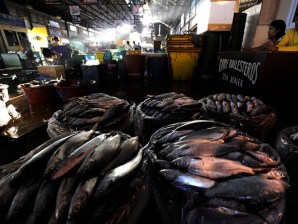Scientists identify deadly tilapia virus
MIAMI, United States — International scientists said Tuesday they have identified a new virus that is killing both wild and farmed tilapia fish, an important global food source worth $7.5 billion each year.
The culprit is related to a family of influenza viruses, and appears to kill fish by causing brain swelling in tilapia in Israel and liver disease in the fish in Ecuador, said the findings in the journal mBio.
The newly identified pathogen, named tilapia lake virus (TiLV), affects tilapia, the world’s second most farmed fish.
READ: Fisherfolk blame El Niño for big drop in fish catch | Fishkill traced to rain, flood, sewage
“Tilapia is one of the most important fish industries worldwide,” said co-author Eran Bacharach, a molecular virologist at Tel Aviv University.
“Moreover, because they eat algae, they are ecological gatekeepers for freshwater and they are an inexpensive, important source of protein in poorer countries.”
Scientists still know little about the virus’ biology, where it originated, or how it made its way into Israel in 2009 and two years later, to commercial ponds in Ecuador. A future research paper will describe its effects in Colombia as well, the authors said.
In Israel, the virus affected both wild tilapia species in Kinneret Lake, also known as the Sea of Galilee, and fish in commercial ponds.
Annual yields from Israel have dropped as much as 85 percent.
Knowing more about the virus could speed efforts to craft a vaccine.
“We are shifting our focus now to implementing diagnostic tests for containment of infection and to developing vaccines to prevent disease,” said co-author Avi Eldar of the Kimron Veterinary Institute in Bet Dagan, Israel.
According to researcher Ian Lipkin of Columbia University, “building a vaccine would save billions of dollars and preserve an industry that ensures employment in the developing world and food security.”
